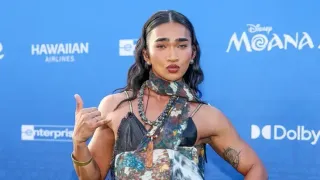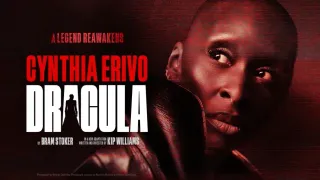June 7, 2022
Planet Queer: Bertrand Mandico's 'After Blue (Dirty Paradise)'
Brandon Judell READ TIME: 4 MIN.
Imagine Hieronymus Bosch as a lesbian filmmaker on acid, and you've almost visualized "After Blue (Dirty Paradise)." Yes, it's sort of 'The Garden of Earthly Delights' redux.
However, while the feature's French director Bertrand Mandico might heartily agree, his main intention is to realize his celluloid philosophy in a spectacularly visual sci-fi/surrealist-western venture sprinkled throughout with frontal female nudity plus ejaculating tree branches. You see, he's co-creator of "The Incoherence Manifesto," a philosophical treatise on how to make a movie.
To be "incoherent," according to Mandico, "means to have faith in cinema. It means to have a romantic approach, unformatted, free, disturbed and dreamlike, cinegenic, an epic narration. Incoherence that's an absence of cynicism but not irony."
In other words, just go with the flow. If you don't comprehend exactly what's occurring on-screen, you'll still be having a hoot asking yourself, "Does that blind android really have tentacles for a penis that can strangle you?" "Do Poles really piss in their boots to keep warm?" "Why are all the pistols named after clothing designers?" So don't drop your pearls when someone indeed threatens, "I'll shoot you with my Gucci."
None of the above will be surprising to those who've viewed the director's "The Wild Boys" (2019). In that award-winner, a group of well-to-do lads, all portrayed convincingly by young women, are punished for defiling their female instructor after acting out "Macbeth."
Sent off by their parents for sadistic treatment aboard a ship whose captain has tattooed privates, the teens are marooned on an island where they diet mainly on a vagina-like fruit that causes groin transformations. When one character's genitals fall off, he is asked, "What will you do with your dick?" He responds stoically, "What should I do with it? Bury it with dignity."
Dignity is hard to find, even on a picturesque planet called After Blue. Here the new inhabitants are women who've left Earth because it was "sick, rotten." Wouldn't you have joined them? Seemingly, all the males have died off because their hair started growing inwardly. The gals, on the other hand, got hairy necks that constantly have to be shaved.
The plan was to create a Utopia with new mandates to avoid the left-behind errors, including "no machines, no electronics, no screens, no chemistry." They also set up micro-communities based on nationality. Not a good idea if you are seeking eternal peace.
Well, one day, a young bleached-blonde, Roxy (Paula-Luna Retenfelder), along with three of her annoying friends, frolic along a beach. Mid-romp, they came across the head of a Polish woman who's apparently buried up to the neck in sand.
Only Roxy considers digging her out. She does so, and it turns out to be Kate Bush (Agata Buzek), who has one hairy arm and an extra eyeball on her crotch. (You can't help but conclude this film is one long, crazed paean to the similarly named British songstress.)
Once unearthed, Ms. Bush immediately guns down the self-involved partiers and then grants Roxy three desires after making out with her and forcing the girl to kneel. Eye-to-eye contact has seldom been so bizarre.
Jump cut: After Bush departs, Roxy informs her community, that's dressed up as witches, of the slaughter. The town's vengeful leader insists Zora (Elina Löwensohn), Roxy's hairdresser-mother who's the local neck-shaver, immediately go kill the murderess and bring back her corpse: "Take your lovely daughter and a warm coat so you don't die. You'll wait for Kate Bush to come dance the polka."
The rest of "After Blue" is a chronicle of that quest, and quite a resplendent trek it is. Toma Baqueni's elaborately detailed dreamlike sets, Pauline Jacquard's highly textured and easy-to-shed costumes, Pierre Desprats's addictive musical notes, plus the rest of tech folks, meld their warped imaginations into a highly creative vision that would have had the Brothers Grimm applauding in their lederhosen.
The dialogue is also highly quotable: "She could cut her own horse's throat while listening to disco." "Painting exists only if the eyes can embrace it."
There's even a memorable marriage proposal after a rather grotesque femme knows Zora for a whole minute.
Grotesque Femme: I'm looking for a wife because my wife is dead. I'm not that young, but we could get along, you and I.
Zora: No thanks.
Clearly, those embracing "Downton Abbey: A New Era" and its inept treatment of queer wooing should probably skip "After Blue." It's not for all tastes. But if you idolize the early films of David Lynch and Alejandro (El Topo) Jodorowsky, if you desire a 94% testosterone-free movie experience, and if you dream now and then of owning a complete set of Crayola crayons, look no further.
www.alteredinnocence.net/afterblue
Help keep the Bay Area Reporter going in these tough times. To support local, independent, LGBTQ journalism, consider becoming a BAR member.






